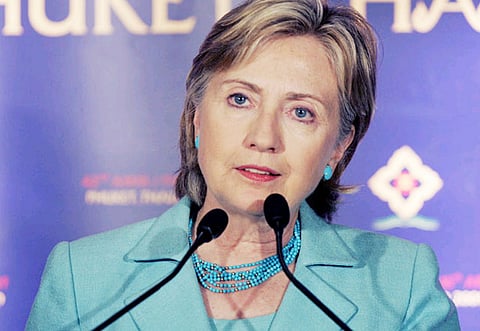The same old dalliance with controversy
The questions surrounding her email account revive the impression that she has a penchant for secrecy

The circus is back in town.
Hillary Clinton has not yet even announced that she is running for president, but the spectacle of the Clinton years is unfolding again, touched off by the controversy over her practice of using a private email account, rather than an official one, while she was secretary of state. Her defence, which was simply that it was more convenient to do it that way, is unlikely to satisfy her critics or stop the questions. Hillary’s campaign-in-waiting had long planned for last Tuesday to be an intentional echo of one of her most inspirational moments — a commemoration at the United Nations of the 20th anniversary of a speech that Hillary had delivered at a conference in Beijing. It was there that the then-first lady had declared that “it is no longer acceptable to discuss women’s rights as separate from human rights” and began to lay out the premise that would be the hallmark of her tenure as a 21st century secretary of state.
But the day ended up feeling more like a throwback to the darker side of 1990s politics, when — with just two hours to spare before her United Nations address — Hillary’s spokesman Nick Merrill announced that she would hold a “brief press conference” after her speech.
It has been a week since news broke about Hillary’s use of a personal email account — a violation of White House guidelines at the time, encouraging the use of government email accounts. Hillary had no such government account and did not turn over what she said was relevant material from her personal email until nearly two years after she left the State Department. Since that violation became public, the airwaves have been filled by a familiar cast of characters who have stirred uncomfortable memories, even as they have leapt to her defence.
“Do you remember Whitewater? Do you remember Filegate? Do you remember Travelgate? Do you remember Pardongate?” former Clinton strategist James Carville asked Andrea Mitchell on MSNBC.
For viewers old enough to remember, the details of those scandals and pseudoscandals may be hazy, but the impression lingers of a presidency that ran as a perpetual war room. Indeed, that was one of the reasons that Hillary lost in 2008, the first time she ran for president, to a younger, fresher figure who offered a chance to turn the page.
Nor was Carville the only figure having a back-to-the-future moment on cable as a result of the latest controversy.
On Fox News last Sunday, former Clinton White House lawyer Lanny Davis had attempted a clumsy, legalistic rationale on Hillary’s behalf, only to be asked by moderator Chris Wallace: “Do you ever get tired of cleaning up after the Clintons?”
On CNN, designated wiseman David Gergen — who had been brought into the Bill Clinton White House in 1993 to help its image — ruminated that Hillary Clinton had been “badly damaged” because she was reminding voters of “some of the worst aspects of the 1990s”. Hillary’s tenure as President Barack Obama’s secretary of state gave her a chance to reset her own image. But the questions surrounding her email account revive the impression that she has a penchant for secrecy. Meanwhile, the finances of the foundation that she runs with her husband and daughter Chelsea have also raised issues of transparency and forthrightness.
Part of the problem is the fact that Hillary has yet to officially announce that she is running for president, much less put together the kind of rapid-response operation for which the Clintons have been known. When Bill Clinton first ran for president in 1992, Carville famously wore a T-shirt emblazoned, “Speed kills”.
That her team picked the high-security United Nations headquarters as a venue for her news conference only heightened the spectacle by sending journalists to scramble for credentials that generally take days to arrange. The line wrapped around the block outside the cramped office, where a single staffer was handling the requests.
Republicans accused Hillary of manipulating access to her news conference. “Hillary Clinton’s response to her email scandal is already turning into another exercise in limiting transparency,” Michael Short, a spokesman for the Republican National Committee, said in a statement. “She and her team had perhaps hundreds — if not thousands — of options for a venue for today’s press conference on her secret email scandal, but Clinton instead chose one of the most difficult places for reporters to get access to: The UN.”
Merrill labelled that line of argument “the RNC’s Malarkey Express” — a statement that, perhaps unintentionally, evoked Hillary’s 1998 contention that a “vast Right-wing conspiracy” was at work against her husband. Last Tuesday’s news conference was not the first time Hillary had felt compelled to call a news conference to defend her ethics. In 1994, questions swirled around the Clintons’ investment in a failed land venture known as Whitewater and the startling success Hillary had had trading cattle futures. The first lady summoned reporters to the State Dining Room of the White House and spent more than an hour answering questions about her dealings.
Hillary said then that she had failed to appreciate the realities of public life.
“My sense of privacy ... led me to perhaps be less understanding than I need to [be] of both the press and the public’s interest, as well as [their] right to know things about my husband and me,” she said. “I’ve always believed in a zone of privacy. And I told a friend the other day that I feel after resisting for a long time I’ve been rezoned.”
That line, she later wrote in her memoir, “made everyone laugh”.
— Washington Post
Sign up for the Daily Briefing
Get the latest news and updates straight to your inbox


